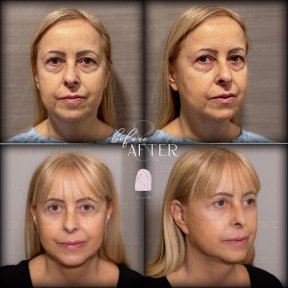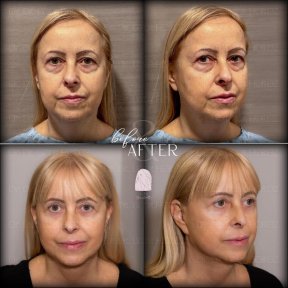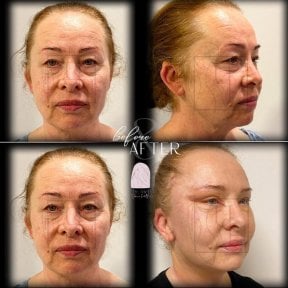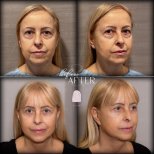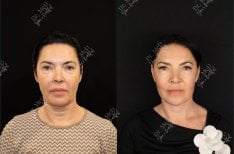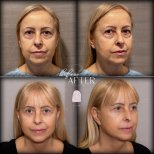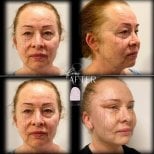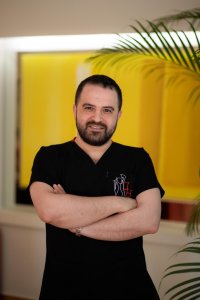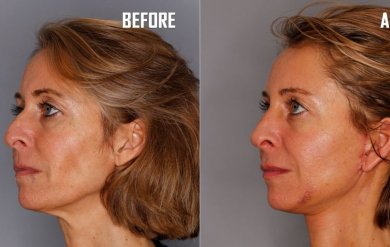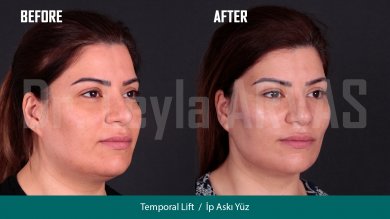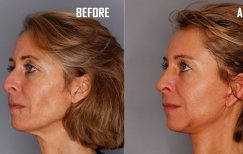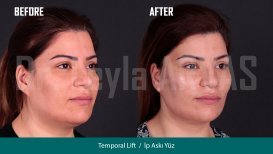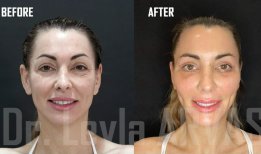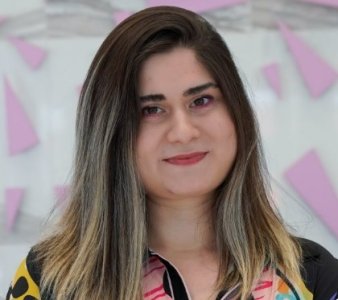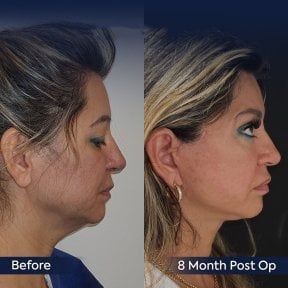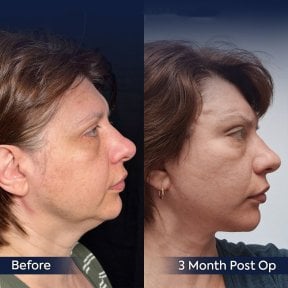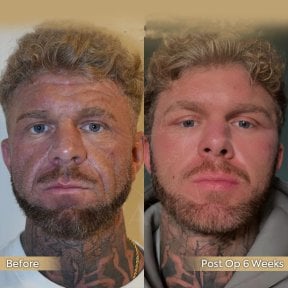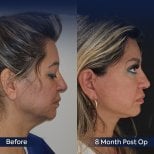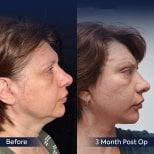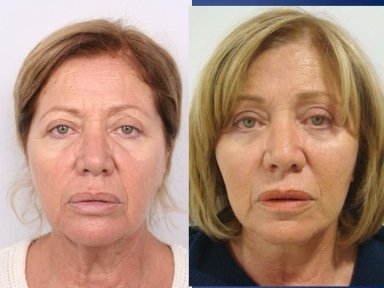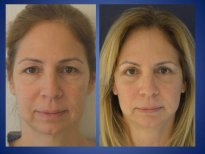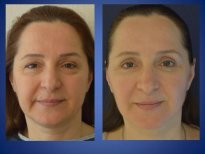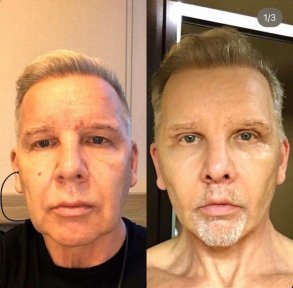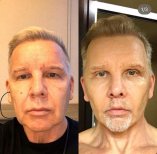Deep plane technique addresses muscle and skin layers for more natural, longer-lasting results. European Board-certified surgeon Dr. Ugur Horoz, who has performed 900+ facelifts and trained in Japan, performs the procedure at Dr. MED. The comprehensive package costs around $9,130, covering surgery, a 4-star hotel stay, and VIP transfers. It includes a detailed 7-day recovery plan and post-operative follow-ups for optimal healing. The JCI-accredited clinic meets high international safety standards for its patients.
What is a facelift surgery?
A facelift surgery, medically known as a rhytidectomy, is a cosmetic surgical procedure aimed at creating a younger appearance in your face. This procedure can reduce sagging or folds of skin on the cheeks and jawline, addressing other changes in facial shape that occur with age. The surgery involves manipulation of the SMAS (Superficial Musculoaponeurotic System), a layer of muscle and connective tissue beneath the skin, which provides the foundation for long-lasting, natural-looking results.
Why do people go to Turkey/Istanbul for a rhytidectomy?
People opt to travel to Turkey and Istanbul for facial rejuvenation surgery for several compelling reasons. Turkey has 425 clinics offering facelift procedures, making it one of the world's largest medical tourism destinations for facial rejuvenation. Turkey has served over 1.7 million facelift procedure requests through Bookimed alone, demonstrating the country's extensive experience in facial rejuvenation surgery. The country is projected to host 2.5 million medical tourists annually by 2025, making it one of the world's top medical tourism destinations.
Istanbul, in particular, has emerged as a popular medical tourism destination due to its access to highly skilled plastic surgeons at top-rated facilities including Dr. MED Clinic (4.9/5, Istanbul), Dr. Safa Manav Clinic (4.8/5, Istanbul), and Quartz Hospital (4.7/5, Istanbul). Leading facilities such as Dr. MED Clinic maintain international standards with a 97% success rate for facelift procedures and serve over 4,500 patients annually.
- Quality assurance. Turkey maintains 46 JCI-accredited hospitals, with 25 located in Istanbul alone. This represents one of the highest concentrations of internationally accredited medical facilities globally.
- Cost advantages. Facelift procedures in Turkey range from $4,000–$7,600, compared to $12,000–$24,000 in the United States, offering significant cost savings without compromising quality (Bookimed data, November 2025).
What methods are used in a cosmetic facelift?
Several surgical techniques are utilized in facial rejuvenation procedures, each with specific advantages:
- The traditional facelift. This involves making an incision around the hairline and behind the ears to pull back and tighten the skin, effectively reducing wrinkles and sagging.
- The mini facelift. Involves smaller incisions and less skin removal than a traditional approach. This technique is suitable for patients with less pronounced skin sagging and offers shorter recovery times.
- The neck lift. Specifically targets sagging and wrinkles in the neck area, often performed alongside a traditional facial procedure for comprehensive rejuvenation.
How do you get ready for a facelift surgery?
Preparation for this cosmetic procedure involves several important steps:
- Medical evaluation. Your surgeon will conduct a comprehensive health assessment to ensure you're fit for the procedure, as demonstrated by leading clinics like Dr. MED Clinic which maintains a 97% success rate through thorough patient assessment protocols.
- Quit smoking. If you're a smoker, you'll need to stop at least a few weeks before surgery to improve healing and reduce complications.
- Avoid certain medications. You may be asked to discontinue taking certain medications or supplements that can increase bleeding risk.
What care is needed after a facial rejuvenation surgery?
Post-operative care following your procedure is crucial for optimal results. Here's a detailed recovery timeline:
Days 1–2: Expect grogginess and tightness. Most patients need prescription pain medication and should sleep with head elevated. Follow-up visit typically occurs on day 2.
Days 3–4: Swelling and bruising peak during this period. This is often the most challenging time psychologically, but improvement begins after day 4.
Days 4–6: Most patients no longer need prescription pain medication. Swelling begins to decrease and light housework may be permitted.
Days 7–14: Sutures are typically removed between days 7–10. Some swelling and bruising remain normal. Many patients feel ready to return to work by the end of week 2.
Weeks 3–4: According to American Society of Plastic Surgeons guidelines, most patients return to normal activities within 2–3 weeks.
Months 2–3: Final results become apparent as residual swelling resolves completely.
What about patient satisfaction and long-term results?
Facelift surgery demonstrates high patient satisfaction rates both short-term and long-term. According to multiple clinical studies:
Short-term satisfaction (1 year): Over 92% of patients report positive experiences, with satisfaction rates consistent across validated surveys including the Facelift Outcomes Evaluation (85.9%), Owsley Facelift Satisfaction Survey (92.1%), and Face-Q assessment (90.5%).
Long-term satisfaction (10+ years): A landmark study following patients for an average of 12.6 years found that 68.5% still rated their results as 'very good or beyond expectations,' and 68.5% felt that 10 or more years had been added to their youthful appearance.
A patient from Germany who received treatment at Soraca Med shared: "The operation went very well. I am very very happy about the result, it looks just fantastic."
What are the possible risks with a facelift surgery?
Like any surgical procedure, facial rejuvenation comes with potential risks. According to a comprehensive study of 11,300 patients published in Aesthetic Surgery Journal, facelifts performed by board-certified plastic surgeons have a 1.8% overall complication rate. The most common complications are hematoma (1.1%) and infection (0.3%).
Risk Factors: Male patients have a 3.9 times higher risk of hematoma, while patients with BMI ≥25 have a 2.8 times higher infection risk. Combined procedures increase the complication rate to 3.7% compared to 1.5% for facelifts alone.
These risks are significantly minimized when procedures are performed in accredited facilities by experienced surgeons. A medical professional from the United States who received treatment at Group Florence Nightingale Hospitals stated: "Wonderful MDs and cuisine. I'm in the medical field and Istanbul met my exacting standards."
Are there different methods for a surgical facelift procedure? How do they compare?
Yes, there are different surgical approaches for facial rejuvenation, as explained above. The best technique for you will depend on your individual needs, skin condition, and aesthetic goals.
In general, a traditional approach offers the most dramatic and long-lasting results. However, it also involves a longer recovery period compared to less invasive options like the mini procedure. Leading specialists such as Dr. Ergin Er at Istanbul Aesthetic Plastic Surgery Center and Dr. Murat Yaman at Lokman Hekim Istanbul Hospital bring extensive experience to help patients choose the most appropriate technique.
Who should consider a facelift surgery?
This cosmetic procedure is typically considered by individuals who are experiencing signs of aging such as sagging skin, deep lines, or loss of muscle tone in the face and neck.
It's important for candidates to have realistic expectations about the outcomes and be in good overall health before undergoing the procedure. Board-certified specialists including Dr. Ali Sadioglu at Dr. Safa Manav Clinic offer comprehensive consultations to determine candidacy.
When is a good time to get a facial tightening surgery?
There is no "right" age to get facial rejuvenation surgery, as it largely depends on individual needs and circumstances. Recent industry trends show that the average facelift patient age is decreasing, with patients aged 35–55 now comprising 32% of procedures (up from 26%), while the traditional average age remains 58–59 years.
The timing varies based on genetics, lifestyle factors, and personal preferences. However, most people start considering this procedure from their 40s onwards, when signs of aging become more noticeable and bothersome.
Do clinics offer a check-up before a facelift surgery?
Yes, reputable clinics typically offer a comprehensive pre-operative evaluation before any facial rejuvenation procedure. This ensures you're in good health and that the surgery is safe for you.
This assessment includes a detailed consultation with the plastic surgeon and potentially other specialists, as well as blood tests and other necessary medical evaluations. Quality facilities maintain rigorous assessment protocols to ensure patient safety and optimal outcomes.
What's included in the facelift surgery package in Turkey?
The comprehensive facial rejuvenation package in Turkey typically includes:
- The primary procedure itself, along with additional treatments like neck lift and eyelid correction if needed
- Accommodations and airport/hotel transfers
- Blood tests and consultation
- Follow-up check-ups and all post-operation medication
- General anesthesia and hospitalization
- Comfortable hotel stay during recovery
A patient from the United States treated at VG Plastic Surgery praised: "Dr. Im is amazing, he not only is an excellent surgeon but he is also a very kind attentive doctor."
What other treatments do clinics in Turkey offer besides a facelift surgery?
Turkish clinics offer a comprehensive range of other cosmetic procedures. These include:
- rhinoplasty (nose job);
- abdominoplasty (tummy tuck);
- liposuction;
- breast augmentation;
- various non-surgical treatments.
Popular non-invasive options include Botox injections, dermal fillers, and other facial rejuvenation treatments that complement surgical procedures.
What qualifications should the surgeon have?
A qualified plastic surgeon should have a medical degree from a recognized university and completed specialized training in plastic surgery. They should be certified by a recognized professional body such as the American Board of Plastic Surgery or its equivalent in other countries.
Additionally, they should have several years of experience specifically performing facial rejuvenation procedures and demonstrate a strong track record of successful outcomes.
What awards should a good clinic have?
A reputable clinic should ideally have accreditation from recognized international healthcare bodies like the Joint Commission International (JCI). This accreditation ensures adherence to international standards of care and safety.
Awards for patient safety, quality of care, and excellence in cosmetic surgery are also strong indicators of a trustworthy and professional clinic. Turkey's 46 JCI-accredited hospitals represent one of the highest concentrations of internationally certified medical facilities globally.
